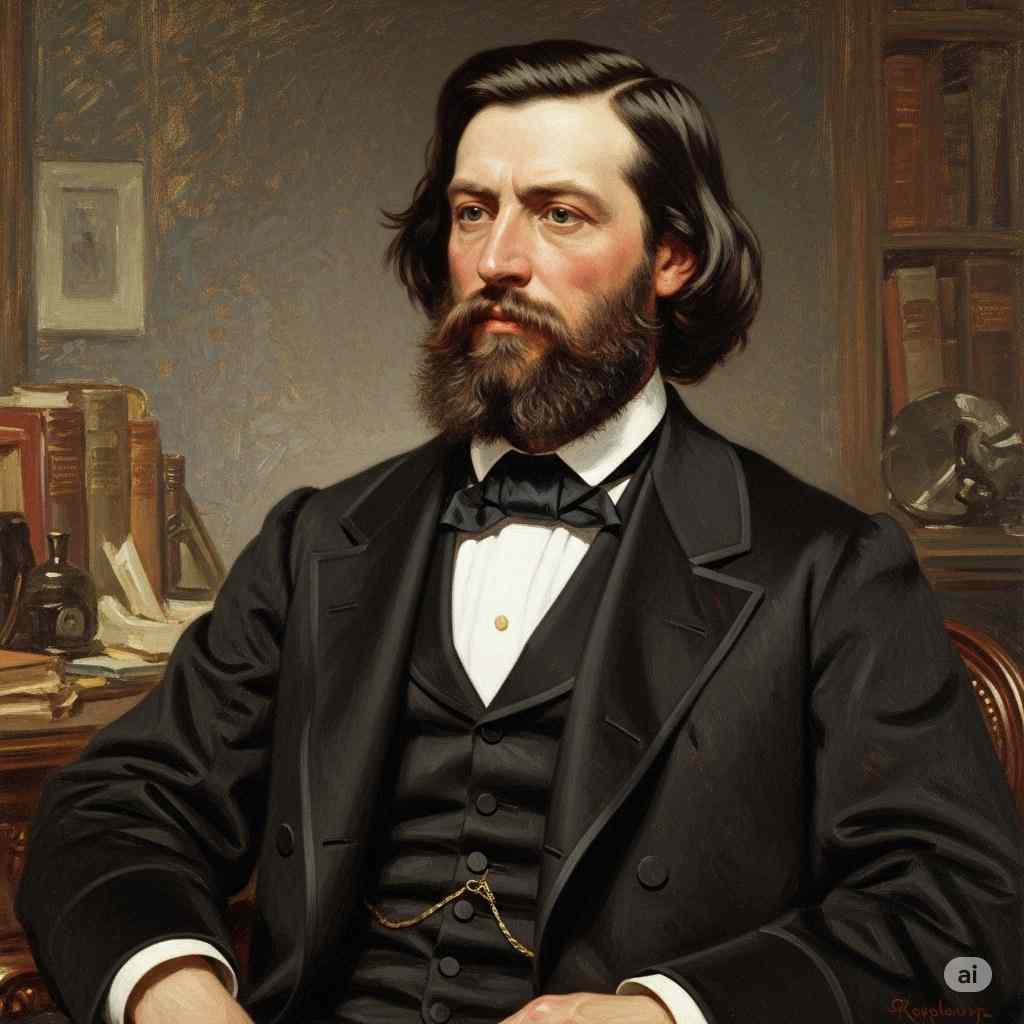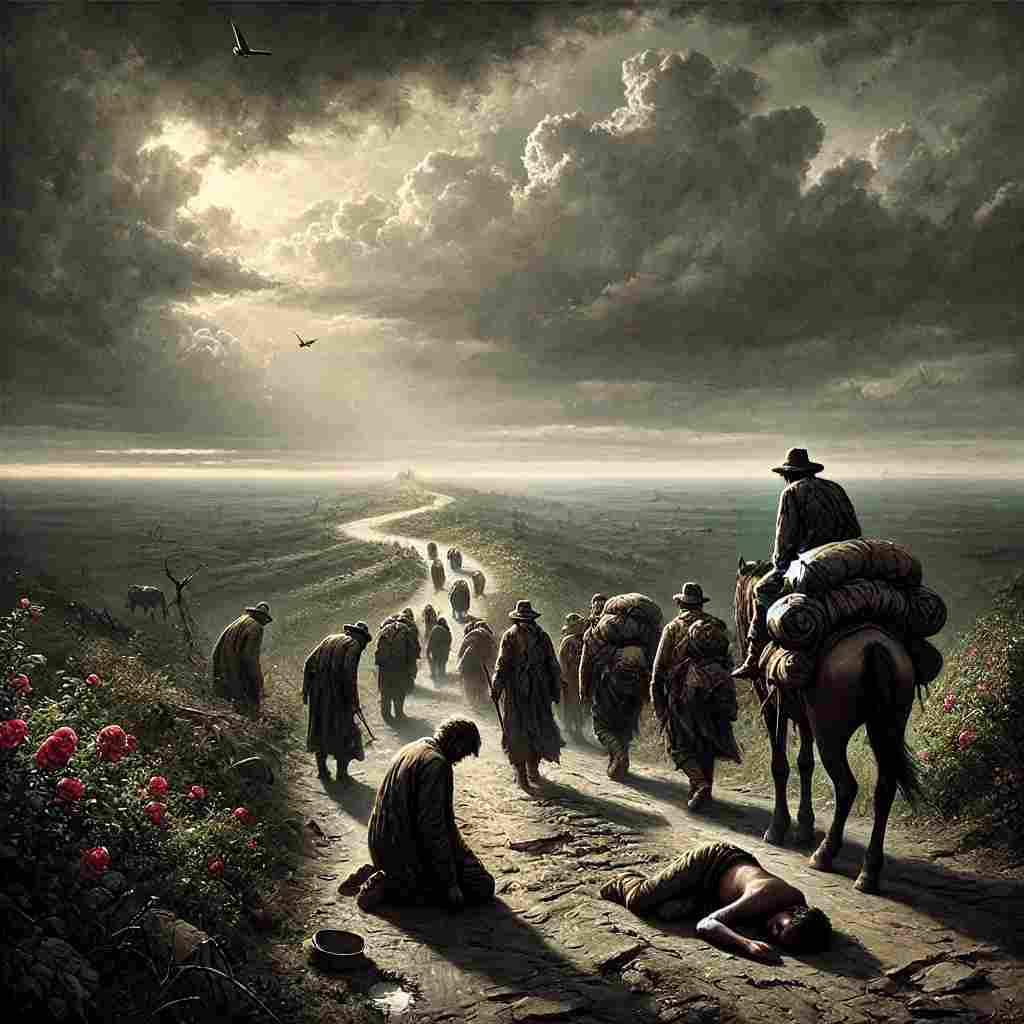1 Poems by Joaquin Miller
1837 - 1913
Joaquin Miller Biography
Joaquin Miller, whose birth name was Cincinnatus Hiner Miller, was an American poet who embodied the spirit of the Wild West in his life and work. Born in 1837 in Indiana, he spent his formative years in the untamed landscapes of Oregon and California, experiences that would profoundly influence his poetry. Miller's adventurous life, which included stints as a gold miner, a Pony Express rider, and a lawyer, provided him with a wealth of material for his writing. He became known for his vivid depictions of the American West, its landscapes, and its people, earning him the moniker "Poet of the Sierras."
Early Life and Adventures
Miller's early life was marked by restlessness and a thirst for adventure. His family moved to Oregon in 1852, seeking new opportunities in the West. Young Cincinnatus, as he was then known, embraced the rugged lifestyle, working as a cook in a mining camp and later joining the California Gold Rush. He also spent time living with Native American tribes, an experience that would later inform his poetry. In 1859, Miller participated in the Battle of Castle Crags, fighting alongside the Modoc Indians against white settlers. This event, and his subsequent association with the Modoc people, would later become a source of controversy in his life.
Literary Beginnings
Miller's literary career began in earnest in the 1860s. He published his first collection of poems, Specimens, in 1868, followed by Joaquin et al. in 1869. These early works showcased his romantic and often melodramatic style, which drew inspiration from the natural beauty and dramatic events of the West. Miller's poetry often celebrated the rugged individualism and freedom associated with frontier life, themes that resonated with readers at the time.
The Danites in the Sierras
In 1870, Miller achieved his first major success with the play The Danites in the Sierras. This melodrama, based on his experiences with the Mormon community in California, was a critical and commercial hit. It ran for over a year in New York City and further solidified Miller's reputation as a writer who could capture the essence of the American West.
Songs of the Sierras
Miller's breakthrough as a poet came in 1871 with the publication of Songs of the Sierras. This collection, which included poems such as "Arizonian" and "Kit Carson's Ride," established him as a leading voice in American literature. Miller's vivid descriptions of the Western landscape and his romanticized portrayals of frontier life captivated readers and critics alike. The collection's success led to Miller's travels to England, where he was warmly received by the literary establishment.
Life in England and Later Works
Miller's time in England proved to be a fruitful period in his career. He befriended prominent literary figures such as Dante Gabriel Rossetti and Christina Rossetti, and his work was praised by critics such as Alfred Tennyson. Miller continued to publish poetry throughout the 1870s and 1880s, including collections such as Songs of the Sun-Lands (1873) and Songs of the Mexican Seas (1887). These works further explored themes of nature, adventure, and the American West, cementing Miller's reputation as a poet of the frontier.
Later Life and Legacy
In his later years, Miller returned to the United States and settled in California. He continued to write and publish poetry, though his later works received less critical acclaim than his earlier collections. Miller's personal life was often tumultuous, marked by multiple marriages and strained relationships with his children. He died in 1913 at his home in Oakland, California.
Joaquin Miller's legacy is complex and multifaceted. He is remembered as a pioneer of Western American literature, a poet who captured the spirit of the frontier in his vivid and often romantic verse. His work helped to shape the image of the American West in the popular imagination, and his influence can be seen in the work of later Western writers. However, Miller's legacy is also intertwined with controversy. His association with the Modoc Indians and his sometimes-sensationalized portrayals of Native American life have drawn criticism from some scholars. Despite these controversies, Joaquin Miller remains an important figure in American literature, a poet whose work continues to fascinate and inspire readers today.
Major Works:
- Specimens (1868)
- Joaquin et al. (1869)
- The Danites in the Sierras (1870)
- Songs of the Sierras (1871)
- Songs of the Sun-Lands (1873)
- Songs of the Mexican Seas (1887)
Critical Analysis:
Joaquin Miller's poetry is characterized by its romanticism, its vivid imagery, and its celebration of the American West. His work often explores themes of nature, adventure, and individualism, reflecting the spirit of the frontier. Miller's writing is also notable for its use of melodrama and its sometimes-sensationalized portrayals of violence and conflict. While his work has been praised for its energy and its evocation of the Western landscape, it has also been criticized for its lack of subtlety and its romanticized view of frontier life.
Despite these criticisms, Joaquin Miller remains an important figure in American literature. His poetry helped to shape the image of the American West in the popular imagination, and his influence can be seen in the work of later Western writers. Miller's legacy is complex and multifaceted, reflecting the contradictions and complexities of the era in which he lived. He is remembered as a poet of the frontier, a writer who captured the spirit of the American West in all its beauty and brutality.
This text was generated by AI and is for reference only. Learn more
Username Information
No username is open
Everything is free to use, but donations are always appreciated.
Quick Links
© 2024-2025 R.I.Chalmers (V2Melody).

All music on this site by R.I.Chalmers (V2Melody) is licensed under a Creative Commons Attribution-NonCommercial 4.0 International License.
Attribution Requirement:
When using this music, you must give appropriate credit by including the following statement (or equivalent) wherever the music is used or credited:
"Music by R.I.Chalmers (V2Melody) – https://v2melody.com"
Support My Work:
If you enjoy this music and would like to support future creations, your thanks are always welcome but never required.
Thanks!


